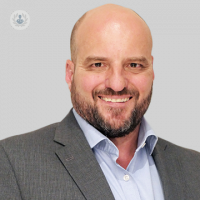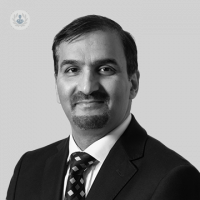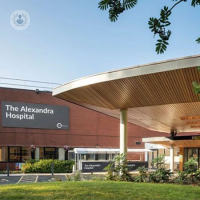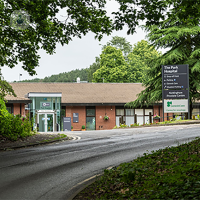What is carotid artery disease?
The blood is delivered to the brain and the head through the carotid arteries. When plaques (fatty deposits) begin to clog the blood vessels in these arteries, this can cause a blockage, which is referred to as carotid artery disease. It is a slow-developing condition but it is one of the major causes of stroke, causing between 10-20% of strokes.

What causes carotid artery disease?
Carotid artery disease is caused by buildup of plaques in the arteries delivering blood to the brain and head. Plaques are made up of debris, including calcium build-up, cholesterol, and other cells and tissues. The risk of developing carotid artery disease is increased if you have:
- High blood pressure
- High blood-fat levels
- Diabetes
- A history of it in the family, or coronary artery disease
- Sleep apnoea
Other risk factors include obesity, lack of exercise, and age. If you smoke, you are also at greater risk of developing carotid artery disease.
What are the symptoms of carotid artery disease?
Carotid artery disease may not produce any symptoms at first. The first indication of carotid artery may in fact be a stroke, or something called a transient ischaemic attack (TIA), which is a temporary shortage of blood to the brain. The FAST test indicates the warning signs of a stroke:
- Face: has the face fallen on one side? Can they smile?
- Arms: can they raise their arms and hold them there?
- Speech problems: is speech slurred? Can they understand what you’re saying to them? Can they speak clearly?
- Time: the signs above indicate it’s time to call 999.
Other symptoms of stroke can also present, including sudden weakness or numbness on one side of the body, sudden blurred vision, sudden loss of sight in one or both eyes, a sudden severe headache, and a sudden loss of memory or sudden confusion. In a TIA, symptoms are similar, but they only last for a short time.
What is the treatment for carotid artery disease?
Treatment for carotid artery disease focusses on preventing stroke and TIA. Your doctor may recommend lifestyle changes which slow down the progression of the condition if the blockage is mild. Medication may also be prescribed in order to control blood pressure and/or cholesterol. If the blockage is more severe, then a procedure may be required to remove it, especially if you have already had a stroke.
A carotid endarterectomy is most commonly used to remove the blockage and treat carotid artery disease. This involves opening the artery and removing the blockage. However, in some cases surgery may be considered too much of a risk, or the blockage is difficult to remove. In these cases, carotid angioplasty may be recommended, wherein a balloon is entered into the artery through a catheter and inflated to widen the artery. A stent is then inserted to stop the artery narrowing.
Can carotid artery disease be prevented?
You can prevent or slow down the progression of carotid artery disease by making sure to exercise, eating a varied and healthy diet with a variety of fruits and vegetables, reducing or limiting your salt consumption, your cholesterol and fat consumption, and by maintaining a healthy weight.
Which specialist treats carotid artery disease?
A cardiologist treats carotid artery disease, though a surgeon may be involved if surgical procedures are necessary.
05-24-2017 09-28-2023Carotid artery disease
Mr Akin Oluwole - Vascular surgery
Created on: 05-24-2017
Updated on: 09-28-2023
Edited by: Conor Dunworth
What is carotid artery disease?
The blood is delivered to the brain and the head through the carotid arteries. When plaques (fatty deposits) begin to clog the blood vessels in these arteries, this can cause a blockage, which is referred to as carotid artery disease. It is a slow-developing condition but it is one of the major causes of stroke, causing between 10-20% of strokes.

What causes carotid artery disease?
Carotid artery disease is caused by buildup of plaques in the arteries delivering blood to the brain and head. Plaques are made up of debris, including calcium build-up, cholesterol, and other cells and tissues. The risk of developing carotid artery disease is increased if you have:
- High blood pressure
- High blood-fat levels
- Diabetes
- A history of it in the family, or coronary artery disease
- Sleep apnoea
Other risk factors include obesity, lack of exercise, and age. If you smoke, you are also at greater risk of developing carotid artery disease.
What are the symptoms of carotid artery disease?
Carotid artery disease may not produce any symptoms at first. The first indication of carotid artery may in fact be a stroke, or something called a transient ischaemic attack (TIA), which is a temporary shortage of blood to the brain. The FAST test indicates the warning signs of a stroke:
- Face: has the face fallen on one side? Can they smile?
- Arms: can they raise their arms and hold them there?
- Speech problems: is speech slurred? Can they understand what you’re saying to them? Can they speak clearly?
- Time: the signs above indicate it’s time to call 999.
Other symptoms of stroke can also present, including sudden weakness or numbness on one side of the body, sudden blurred vision, sudden loss of sight in one or both eyes, a sudden severe headache, and a sudden loss of memory or sudden confusion. In a TIA, symptoms are similar, but they only last for a short time.
What is the treatment for carotid artery disease?
Treatment for carotid artery disease focusses on preventing stroke and TIA. Your doctor may recommend lifestyle changes which slow down the progression of the condition if the blockage is mild. Medication may also be prescribed in order to control blood pressure and/or cholesterol. If the blockage is more severe, then a procedure may be required to remove it, especially if you have already had a stroke.
A carotid endarterectomy is most commonly used to remove the blockage and treat carotid artery disease. This involves opening the artery and removing the blockage. However, in some cases surgery may be considered too much of a risk, or the blockage is difficult to remove. In these cases, carotid angioplasty may be recommended, wherein a balloon is entered into the artery through a catheter and inflated to widen the artery. A stent is then inserted to stop the artery narrowing.
Can carotid artery disease be prevented?
You can prevent or slow down the progression of carotid artery disease by making sure to exercise, eating a varied and healthy diet with a variety of fruits and vegetables, reducing or limiting your salt consumption, your cholesterol and fat consumption, and by maintaining a healthy weight.
Which specialist treats carotid artery disease?
A cardiologist treats carotid artery disease, though a surgeon may be involved if surgical procedures are necessary.


Carotid artery disease: What are the symptoms of a blocked, or narrowed, neck artery?
By Mr S. Tawqeer Rashid
2025-01-15
The carotid arteries are located in your neck and carry blood away from the heart to the head, brain and face. They also transport oxygen to the front parts of the brain that control our movements, feelings and speech. If these get clogged due to fatty deposits - often described as 'furring of the arteries' - it can lead to life-threatening problems. One of our top vascular surgeons, Mr S. Tawqeer Rashid, explains the warning signs and symptoms of a blocked artery in your neck, and how you can reduce your risk of it developing. See more
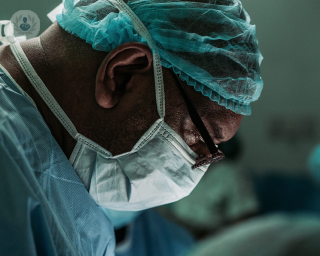

Carotid endarterectomy: preventing another stroke
By Mr Mohamed Abdelhamid
2025-01-13
There are certain ways to treat patients following a stroke due to carotid artery disease in order to prevent them from suffering a further stroke. We spoke to Mr Mohamed Abdelhamid, a top consultant vascular and endovascular surgeon, to find out exactly how patients are treated and what the recovery is like following a carotid endarterectomy procedure. See more
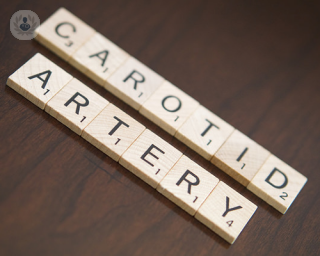

All about carotid arteries
By Dr Digoarachi S Bulugahapitiya
2025-01-11
The carotid arteries, along with the vertebral arteries, are responsible for the supply of blood to the brain. Here, Dr Digoarachi S Bulugahapitiya, renowned consultant cardiologist, provides an expert insight into the different diseases that affect the carotid arteries and how these are surgically treated. See more
Experts in Carotid artery disease
-
Mr Mark Tyrrell
Vascular surgeryExpert in:
- Aortic aneurysms
- Carotid artery disease
- Diabetic foot
- Peripheral arterial disease
- Vascular disease
- Stroke
-
Mr Gary Maytham
Vascular surgeryExpert in:
- Varicose veins
- Peripheral arterial disease
- Aortic aneurysms
- Carotid artery disease
- Diabetic foot
- Lymphoedema
-
Mr S. Tawqeer Rashid
Vascular surgeryExpert in:
- Varicose veins
- Leg ulcers
- Diabetic foot
- Carotid artery disease
- Aortic aneurysms
- Peripheral arterial disease
-
Mr Paul Moxey
Vascular surgeryExpert in:
- Varicose veins
- Spider veins (thread veins)
- Aortic aneurysms
- Peripheral arterial disease
- Carotid artery disease
- Leg ulcers
-
Mr Akin Oluwole
Vascular surgeryExpert in:
- Varicose veins
- Leg ulcers
- Aortic aneurysms
- Carotid artery disease
- Peripheral arterial disease
- Swollen legs
- See all

The Alexandra Hospital - part of Circle Health Group
The Alexandra Hospital - part of Circle Health Group
Mill Ln, Cheadle, SK8 2PX
No existe teléfono en el centro.
By using the telephone number provided by TOP DOCTORS, you automatically agree to let us use your phone number for statistical and commercial purposes. For further information, read our Privacy Policy
Top Doctors

Cleveland Clinic London Hospital
Cleveland Clinic London Hospital
33 Grosvenor Place, SW1X 7HY
No existe teléfono en el centro.
By using the telephone number provided by TOP DOCTORS, you automatically agree to let us use your phone number for statistical and commercial purposes. For further information, read our Privacy Policy
Top Doctors

The Park Hospital - part of Circle Health Group
The Park Hospital - part of Circle Health Group
Sherwood Lodge Drive, Burntstump Country Park, Arnold, Nottinghamshire NG5 8RX
No existe teléfono en el centro.
By using the telephone number provided by TOP DOCTORS, you automatically agree to let us use your phone number for statistical and commercial purposes. For further information, read our Privacy Policy
Top Doctors
-
The Alexandra Hospital - part of Circle Health Group
Mill Ln, Cheadle, SK8 2PX, CheadleExpert in:
- Hip
- Cardiology
- Shoulder and elbow
- Paediatrics
- Foot and ankle
- Knee
-
Cleveland Clinic London Hospital
33 Grosvenor Place, SW1X 7HY, Central LondonExpert in:
- Cardiology
- Colorectal surgery
- Minimal access surgery (keyhole surgery)
- Gallbladder surgery
- Diagnostic Imaging
- Ultrasound
-
The Park Hospital - part of Circle Health Group
Sherwood Lodge Drive, Burntstump Country Park, Arnold, Nottinghamshire NG5 8RX, ArnoldExpert in:
- General Surgery
- Maxillofacial Surgery
- Oral surgery
- Plastic surgery, reconstructive and aesthetics
- Obstetrics and Gynaecology
- Podiatry
- See all
- Most viewed diseases, medical tests, and treatments
- Endovenous laser treatment (EVLA)
- Aortic aneurysms
- Botulinum toxin (Botox™)
- Medicolegal
- Transient ischaemic attack (TIA)
- Minimally invasive artery surgery
- Spider veins (thread veins)
- Venous ulcer
- Flushed face
- Hyperhidrosis


